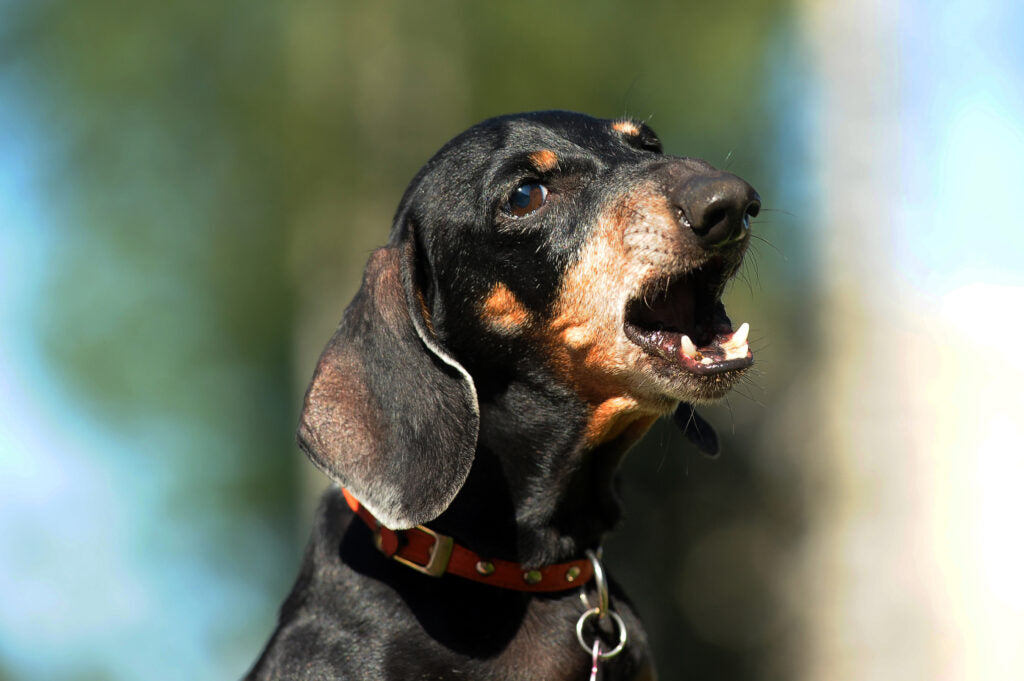Understanding and Managing Aggression in Dachshunds
Posted by ROBERTO BURALLI

Dachshunds are beloved pets known for their loyalty, intelligence, and lively personalities. However, like any breed, they can exhibit aggressive behavior under certain circumstances.
In this article, we will explore the factors that contribute to aggression in Dachshunds and guide how to train and manage these behaviors effectively.
Are Dachshunds Aggressive Dogs?
The breed standard for Dachshunds describes them as "Faithful, versatile and good tempered" with traits such as being "Intelligent, lively, courageous to the point of rashness, obedient." While they are generally friendly and responsive to their owners, individual personalities can vary, and some Dachshunds may be more aggressive than others.
Possessiveness and Territoriality
Dachshunds can become possessive of their family or specific family members, leading to aggressive behavior if they feel their possessions or loved ones are being threatened. Proper socialization from an early age is crucial to prevent this type of aggression.
Barking and Anxiety
Dachshunds are prone to excessive barking, which can be a sign of anxiety or stress. If not addressed, this can sometimes manifest as aggression. Training and socialization can help mitigate these issues.
Aggression Towards Other Dogs
While Dachshunds are generally friendly towards other dogs, especially if socialized properly, some may be more defensive or territorial. This can lead to aggressive behavior, particularly towards larger dogs, if they feel their family or territory is being threatened.

Training Strategies to Reduce Aggression
- Understanding the Breed's Nature: Recognizing the Dachshund's bold and assertive nature is crucial in developing a training plan that addresses these traits effectively.
- Addressing Potential Triggers: Identify and address potential triggers of aggression, such as fear, dominance, or boredom. Work on socialization techniques to help your Dachshund feel more comfortable in various situations.
- Positive Reinforcement Training: Encourage good behavior and discourage aggression by rewarding your Dachshund with treats, praise, and playtime when they exhibit calm and well-behaved conduct.
- Consistency and Patience: Set clear boundaries and rules, and ensure all family members are on the same page to avoid confusion. Consistency and patience are essential when training a Dachshund.
- Socialization: Expose your Dachshund to various environments, people, and animals to help them become confident and well-adjusted. Socialization is critical for any dog, especially Dachshunds.
- Basic Obedience Training: Teach your dog basic commands like "sit," "stay," and "come" to establish a foundation of obedience. Basic obedience training is vital for any dog, but especially for Dachshunds.
- Desensitization and Counterconditioning: Gradually expose your Dachshund to triggers while providing positive associations, such as treats and praise. If your Dachshund exhibits aggression towards specific stimuli, such as other dogs or loud noises, consider desensitization and counterconditioning techniques.
- Managing Environments: Prevent situations that might trigger aggression by avoiding areas where your Dachshund is likely to encounter their triggers, such as other dogs.
- Seeking Professional Help: If your Dachshund's aggression persists or worsens, consider seeking guidance from a certified animal behaviorist or trainer for personalized support.
- Ruling Out Medical Issues: Consult with a veterinarian to rule out any underlying medical issues that might be contributing to sudden or severe aggression.
Related post: Understanding and Addressing Separation Anxiety in Dachshunds

Conclusion
While Dachshunds are generally friendly and loving companions, they can exhibit aggressive behavior under certain circumstances. By understanding the breed's nature, addressing potential triggers, and implementing effective training strategies, you can help reduce aggression in your Dachshund.
Consistency, patience, and a commitment to socialization and training are key to fostering a well-adjusted and harmonious relationship with your furry friend. If aggression persists or worsens, seeking professional help from a certified animal behaviorist or trainer can provide the necessary guidance to address the issue effectively.
SHARE:












